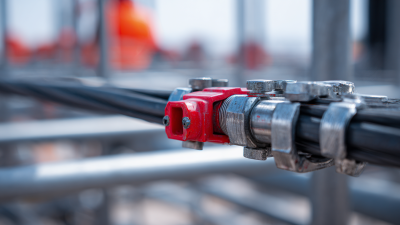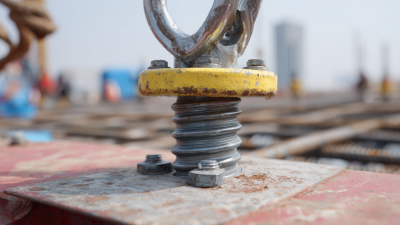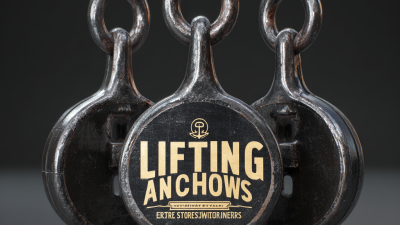Inquiry
Form loading...
When it comes to ensuring safety in industrial settings, the importance of selecting the right components cannot be overstated. Among these components, lock nuts play a pivotal role in securing fasteners and preventing loosening due to vibrations and dynamic loads. Understanding the various types of lock nuts and their unique features is crucial for maintaining structural integrity and enhancing safety. This blog provides five expert tips for choosing the right lock nuts tailored to your specific industrial needs.

We will explore essential factors such as material compatibility, load capacity, and environmental conditions, equipping you with the knowledge to make informed decisions. With these insights, you can enhance not only the performance of your machinery but also the overall safety of your work environment.
In industrial applications, the use of lock nuts has become increasingly critical for ensuring safety and operational efficiency. According to a recent report by the American National Standards Institute (ANSI), nearly 70% of machinery-related accidents can be traced back to loose fasteners. Lock nuts, designed to prevent unscrewing due to vibrations and dynamic loads, play a pivotal role in mitigating these risks. The reliability of lock nuts is further underlined by the Engineering Toolbox, which reveals that implementing high-quality lock nuts can reduce maintenance costs by as much as 30%.
Statistics also show that approximately 20% of all equipment failures are directly related to fastener issues, emphasizing the importance of selecting the right lock nut type. For instance, a study published in the Journal of Mechanical Engineering highlighted that using nylon-insert lock nuts significantly improved joint integrity under varying thermal conditions. By understanding the technical specifications and applicable standards, industrial professionals can make informed decisions that enhance both safety and equipment longevity in their operations.
When it comes to enhancing industrial safety, selecting the right lock nut is crucial. Different types of lock nuts serve varying purposes and applications, making it essential to evaluate which one best suits your needs. For instance, nylon-insert lock nuts are excellent for applications with limited vibrations, as the nylon insert helps to prevent loosening under dynamic conditions. On the other hand, prevailing torque lock nuts provide a more robust option for environments that involve high levels of vibration or extreme temperatures.
It's also important to consider the material of the lock nut. Stainless steel lock nuts offer superior corrosion resistance, making them ideal for outdoor or humid environments. If weight is a concern, aluminum lock nuts are a lightweight alternative that can still deliver impressive strength and performance. Always assess the environment in which the lock nut will operate to ensure that it meets the demands of your specific application.
When it comes to enhancing industrial safety, the choice of lock nuts is pivotal. The material strength of these fasteners plays a critical role in determining their effectiveness and overall safety ratings. The right lock nut can withstand higher stress loads and prevent loosening, thereby ensuring the integrity of machinery and structures. Opting for lock nuts made from high-strength materials, such as steel alloys, can significantly increase durability and resistance to wear and tear.
One essential tip for selecting the appropriate lock nut is to consider the application's specific requirements. For high-stress applications, look for lock nuts designed with added features like serrated faces or nylon inserts that provide additional friction. Another important factor is to verify the compatibility of the lock nut with the corresponding bolt; mismatches can lead to failure. Regular inspections and maintenance of lock nuts are also vital, as even the best materials can degrade over time if not properly managed. Prioritizing these factors in your selection process can markedly enhance industrial safety and operational efficiency.

When selecting lock nuts for industrial applications, adhering to industry standards and regulations is of paramount importance. Compliance not only enhances safety but also ensures that your equipment operates optimally. The first step in this process is familiarizing yourself with the relevant standards such as ISO and ASTM. These organizations provide guidelines that help in choosing the right materials, dimensions, and mechanical properties of lock nuts. By following these criteria, you can mitigate risks associated with equipment failure caused by inadequate fasteners.

Additionally, consider the environment in which the lock nuts will be used. Certain applications expose fasteners to extreme temperatures, moisture, or chemicals, which can influence their performance. It's essential to select lock nuts that are specifically designed to withstand these conditions. For instance, using corrosion-resistant materials is crucial in wet or chemical-laden environments. Furthermore, always validate your choices against industry regulations to ensure compliance and enhance workplace safety.
Finally, don’t overlook the importance of proper installation practices. Even the best lock nut will fail if not installed correctly. Training your workforce on appropriate techniques and the significance of torque specifications can significantly lower the chances of equipment malfunction. Engaging with qualified suppliers who understand your industry’s needs can also provide valuable insights into the most suitable lock nuts for your applications.
When it comes to enhancing industrial safety, selecting the right lock nuts can significantly influence your operational efficiency and bottom line. A cost-benefit analysis shows that investing in high-quality lock nuts can lead to substantial savings in the long run. For instance, using lock nuts designed to withstand vibration can prevent costly machinery failures and downtime, ultimately reducing maintenance expenses.
One tip for choosing the right lock nuts is to consider the specific environment in which they will be used. Lock nuts made from corrosion-resistant materials are essential for industries exposed to moisture or chemicals, saving you from frequent replacements. Additionally, ensuring that the lock nuts you select match the specifications of your equipment can optimize performance and prevent premature wear.
Another important factor is the installation process. Some lock nut designs facilitate easier and quicker installation, saving labor costs and minimizing the risk of errors. Investing a little more upfront in the right products can enhance safety and reliability, translating to significant financial savings over time. By carefully selecting lock nuts based on their long-term benefits, businesses can achieve both safety and cost efficiency.






